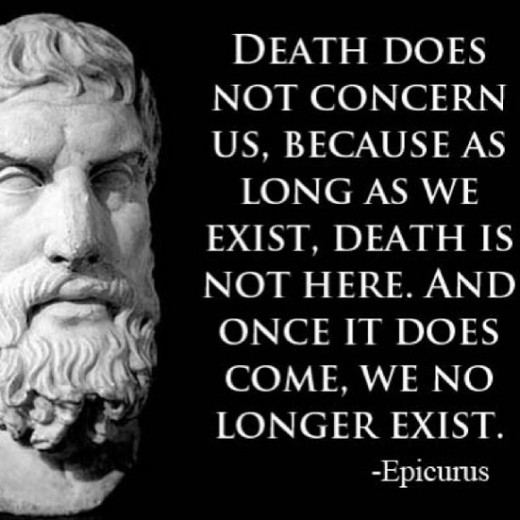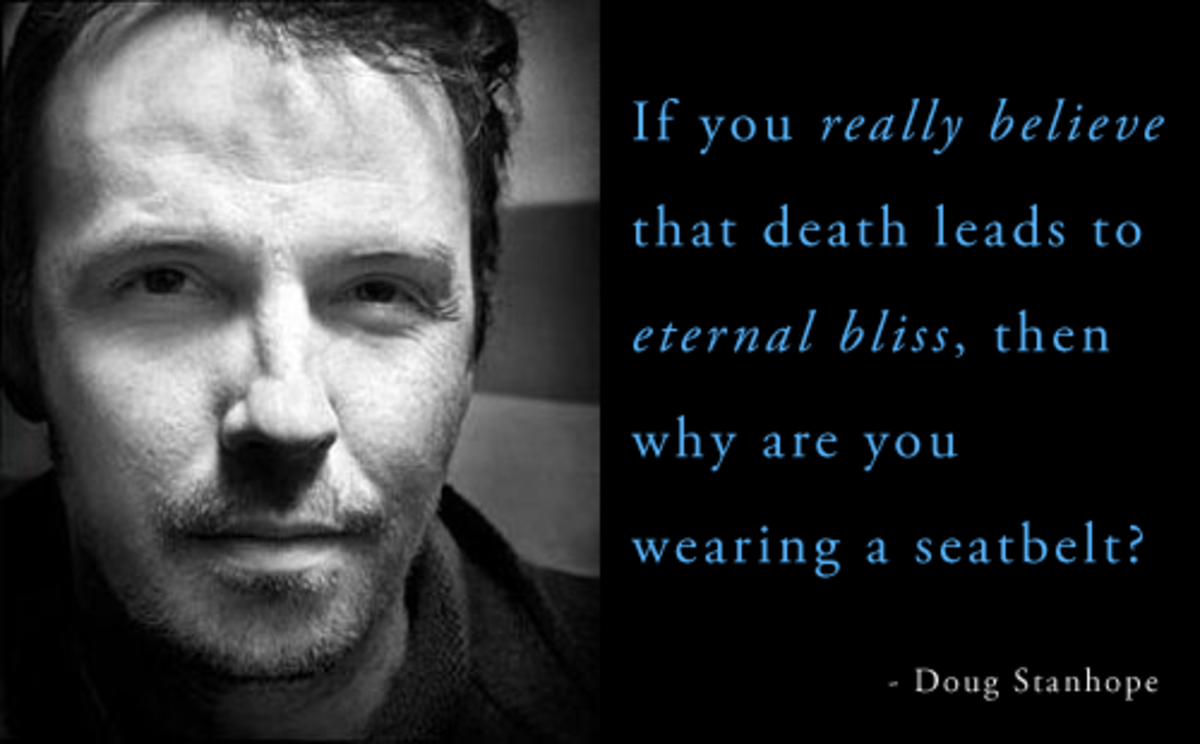Philosophy: On Death

Introduction
Death is not necessarily bad for the self. The actual death of a person is not bad because it involves no experience or future experience whatsoever. Nonetheless, death is bad if and only if a person’s knowledge of its existence causes worse negative consequences to that person in his or her lifetime than that person would have experienced had he or she not ever known of the existence of death. In other words, death is only experienced by a person insofar as he or she anticipates its existence. And, thus, the accumulative effects of such anticipation on a person, when mostly negative, will result in death being “bad” for that individual person.

Epicurean Argument
The act of death cannot be bad since it is an experiential blank. As the Epicurean argument states:
- Dead people have no sensations, a fortiori no bad sensations.
- Nothing is bad for us unless it is, or causes, some bad sensation.
Conclusion: Thus, Being dead is not bad, nor is the event of one’s death.
Of course, this argument relies on the assumption that no afterlife exists. So, the self is not extended whatsoever passed death, according to Epicurus. For the sake of argument, it will be assumed that there is no afterlife because an infinite number of afterlives could logically be possible and so it would be impossible to sort through all of them. Therefore, this essay relies on the premise that death is the end of the self.
Epicurus Proved Wrong
Questioning the Epicurean argument, Brueckner and Fischer criticize premise 2 (Nothing is bad for us unless it is, or causes some bad sensations) in their work, “Why is Death Bad?” They do so by arguing, “Death could be an experiential blank and still be a bad thing” because death is a “deprivation of the good things of life” (Brueckner and Fischer, 1986, 28). Death may not involve any experiences, but it does take away the good experiences that one could have had. But how does this explain “asymmetric attitudes toward prenatal nonexistence and death” (Brueckner and Fischer, 1986, 28)? Rarely, if at all, does one think that it is bad that one missed the possible good experiences that could have come from being born earlier. This asymmetric attitude could be explained by the possibility that “one could have lived longer” but it “is logically impossible that one should have been born much earlier” (Brueckner and Fischer, 1986, 28). This is not an acceptable argument because it relies on people being logical. Indeed, a man who is not purely logical can still think it is bad that he has faced a circumstance out of his control, as is the case with regretting not being born earlier. For example, a man born as a flipper baby could very easily believe it is bad that he was born deformed and regret that he had not been born with fully developed limbs. This is an illogical regret because his birth was out of his control. Hence, the argument that something that is “logically impossible” cannot be seen as bad to people is false.

Why isn't Prenatal Existence Seen as Bad?
The asymmetric attitudes toward prenatal existence (before existence or birth) and death can be explained by people’s indifference to “past pleasures” and their tendency to “look forward to future pleasures” (Brueckner and Fischer, 1986, 28). Brueckner and Fischer back up this claim by their example of the pleasure drug. To summarize, imagine that you wake up at a hospital and the nurse tells you that you either already took the pleasure drug that also delivers amnesia, or you will take it soon. You will hope that you did not already take it because you will want to experience pleasure and do not have any concern for the pleasure that has already passed. Consequently, the perceived good experiences missed by dying make death appear as a bad thing, whereas the perceived good experiences missed by not being born earlier do not really matter. Thus, the Epicurean argument is wrong because, even though the act of death causes no sensations, the missing out of perceived good experiences caused by a death can be bad to a person.

Death is Bad Insofar as we Anticipate it
Since the act of death and the latter consequences of it cannot be bad for a person but a person can perceive his or her death as bad, then death is bad insofar as the total effect of the anticipation of death is bad in a person’s life. The perceived good experiences missed because of death exist wholly in their conceptualization by the person. If a person was not to perceive any loss of good experiences by the cause of death or was not to mourn over these possible experiences, then death cannot be bad to that particular person. Likewise, no knowledge of death within a lifetime makes it impossible for death to be bad for a person. Still, a person may very well constantly fear death, regret that he or she must die all of the time, and never once view death as a good thing; yet, this does not necessarily mean death is a bad thing for that person. To illustrate, a man may avoid going skydiving solely because he fears the death it may bring because he perceives death as bad. The skydiving would have resulted in his death but, since he avoided it, he will live many more years and enjoy many more good experiences than he would have if he died from skydiving. Although this man perceives death as bad, his perception of death does not make his death bad for him because this negative perception of his demise led him to have an overall better life. Therefore, the determinant of death being bad or good for a person is the total effects in a person’s life caused from that person’s reaction to or anticipation of death. The badness of death differentiates from person to person and is largely unknown because one cannot entirely determine the worth of the total consequences of his or her perception of death; one cannot know what could have happened, just as the man in the example who could not have known that he would have died from skydiving.
Conclusion
In conclusion, the badness of death for a person, although very possible, cannot be known. This is because death’s badness relies on the consequences of a person’s perception of death. A person’s perception of death is the only way death can cause any experiences for that person because the actual experience of death results in the loss of the self. Death can definitely be a bad thing because it results from a loss of good experiences for a person. But, this loss of good experiences exists only through the perception of one’s death. Since perception is so subjective and it results in a variety of both negative and positive consequences, the badness of death cannot really be determined.
Reference
Brueckner and Fischer (1986). “Why is Death Bad”? Philosophical Studies.








